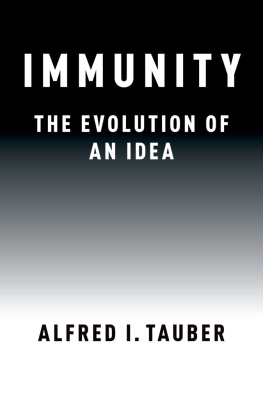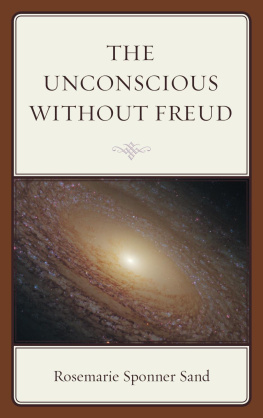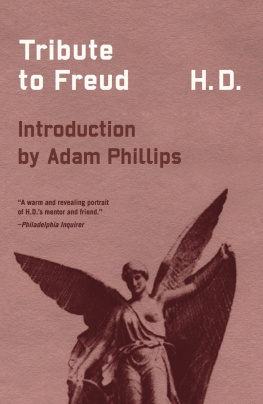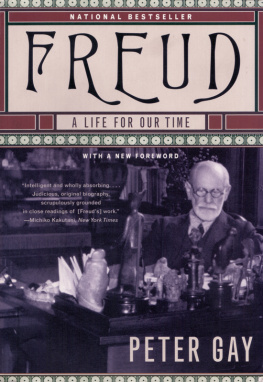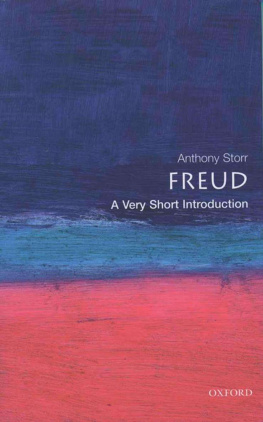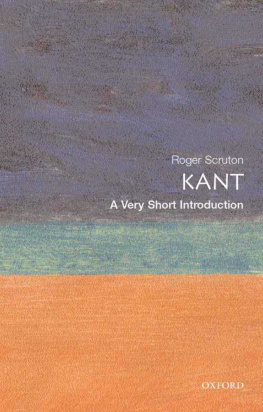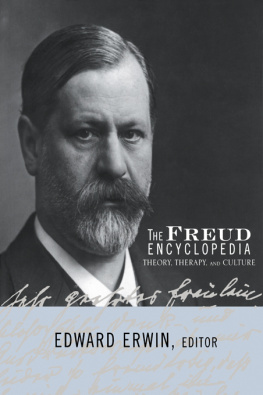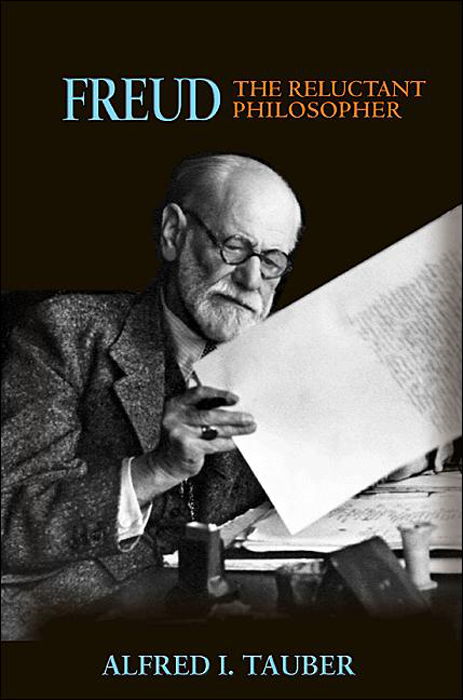FREUD, THE RELUCTANT PHILOSOPHER
Alfred I. Tauber
P R I N C E T O N U N I V E R S I T Y P R E S S P R I N C E T O N A N D O X F O R D
Copyright 2010 by Princeton University Press
Published by Princeton University Press, 41 William Street,
Princeton, New Jersey 08540
In the United Kingdom: Princeton University Press, 6 Oxford Street,
Woodstock, Oxfordshire OX20 1TW
press.princeton.edu
All Rights Reserved
Library of Congress Cataloging-in-Publication Data
Tauber, Alfred I.
Freud, the reluctant philosopher / Alfred I. Tauber.
p. cm.
Includes bibliographical references (p. ) and index.
ISBN 978-0-691-14551-8 (hardcover : alk. paper)
ISBN 978-0-691-14552-5 (pbk.: alk. paper)
1. Freud, Sigmund, 1856-1939Philosophy. 2. Psychoanalysis and philosophy. I. Title.
BF109.F74T38 2010
150.1952092dc22 2010001612
British Library Cataloging-in-Publication Data is available
This book has been composed in Sabon
Printed on acid-free paper.
Printed in the United States of America
1 3 5 7 9 10 8 6 4 2
for Jane
The voice of the intellect is a soft one, but it does not rest till it has gained a hearing. Finally, after a countless succession of rebuffs, it succeeds. This is one of the few points on which one may be optimistic about the future of mankind, but it is in itself a point of no small importance. And from it one can derive yet other hopes.
Sigmund Freud, Future of an Illusion (1927, 53)
freedom in human beingsagainst: there is no freedom, rather everything is natural necessity; it was this that first woke me from my dogmatic slumber and drove me to the critique of reason itself to dissolve the scandal of the contradiction of reason with itself.
Immanuel Kant, letter to Christian Garve,
September 21, 1798
My discoveries are not primarily a heal-all. My discoveries are a basis for a very grave philosophy. There are very few who understand this, there are very few who are capable of understanding this.
Sigmund Freud (1933 conversation, quoted
by Hilda Doolittle 1971, 25)
Contents
Introduction
Psychoanalysis as Philosophy
Chapter One
The Challenge (and Stigma) of Philosophy
Chapter Two
Distinguishing Reasons and Causes
Chapter Three
Storms over Knigsberg
Chapter Four
The Paradox of Freedom
Chapter Five
The Odd Triangle: Kant, Nietzsche, and Freud
Chapter Six
Who Is the Subject?
Chapter Seven
The Ethical Turn
Preface
We shall one day recognize in Freuds life-work the cornerstone for the building of a new anthropology and therewith of a new structure, to which many stones are being brought up today, which shall be the future dwelling of a wiser and freer humanity. This physicianly psychologist will, I make no doubt at all, be honoured as the path-finder towards a humanism of the future, which we dimly divine and which will have experienced much that the earlier humanism knew not of. It will be a humanism bolder, freer, blither, productive of a riper art than any possible in our neurotic, fear-ridden, hate ridden-world. The analytic revelation is a revolutionary force.
Thomas Mann (1947, 427)
T HIS BOOK, PERHAPS INEVITABLY , began as a fantasy: If Sigmund Freud had remained faithful to both domains in which he had studied as a university student (philosophy and medicine [Bernfeld 1951]), how would he then have argued the case for psychoanalysis? More specifically, instead of steadfastly holding to a narrow scientific orientation, how would he have responded to philosophers who might have posed questions that probed the conceptual infrastructure of his theory? Since philosophy was in a particularly rich ferment during the fin de sicle and into the first decades of the twentieth century, ample opportunity for debate against a rich variety of positions suggests robust and enlightening arguments. His disputants, given the opportunity (and inclination), would have undoubtedly offered biting criticism of his philosophical assumptions and, perhaps more generously, encouragement for his larger mission. Those dialogues would have initially drawn in neo-Kantians, Nietzscheans, historicists, phenomenologists, materialists, and hermeneutists, and later Heideggerians, existentialists, Wittgensteinians, and logical positivists. And if Freud had seriously engaged William James (who was ill during their brief encounter in 1909) or John Dewey, then pragmatism would have been thrown into the mix. Each tribe would have challenged Freuds positions as suspect, even highly dubious, given their own commitments. I further imagined that Freud might well have responded with a mixture of robust defenses and reluctant admissions. In the end he would undoubtedly have maintained that psychoanalysis was not philosophy and that it had no pretense of engaging in philosophical discourse. Yet, if pushed, he might have responded along the lines that he did have a philosophical platform: a philosophy of science founded on positivist principles, a mind-body parallelism, and a particular form of naturalism. And here the debate would begin, not only in challenges to his self-declared positions, but also in critiques that would expose Freuds unacknowledged philosophical debts. Indeed, these hidden conceptual sources comprise the heart of my own interpretation of Freuds psychoanalytic theory.
Each of Freuds interrogators, at least according to my initial script, would have chastised him for his reluctance to forthrightly admit his philosophical liabilities and to acknowledge how certain positivist assumptions gnawed at psychoanalytic theory to its detriment. From the neo-Kantian perspective (particularly as advocated by Friedrich Lange and Wilhelm Windelband), Freuds failing to recognize the metaphysical character of his theory not only miscast the unconscious as a scientific object, but also robbed psychoanalysis of its full philosophical character. Accordingly, if Freud left his philosophy undeveloped, he would jeopardize the entire project. The neo-Kantians could then turn the psychoanalytic table and accuse Freud of repression, denial, and worse! The question remains for us, the observers of this imagined interlocutory, how we might better understand psychoanalytic theory when subject to such criticism.
Placing Freud in this postulated dialogue is not entirely contrived, because he knew the basic outline of the philosophical tradition as taught in the 1870s. Moreover, we have evidence that he continued to entertain the relation of psychoanalytic theory to Kant and to other philosophers as he also took pains to convince himself and his readers that he was not doing philosophy. And then, with some inconsistency, he played to the philosophers band by imagining that instead of rejection, the new theory would be all the more likely to meet with applause from philosophers (Freud 1925b, 216), as he hoped to direct them towards a new understanding. By and large he failed, and in frustration he would rant throughout his career against the consciousness-oriented philosophies of mind as misdirected.
While Freuds critique focused on the centrality of unconsciousness as an alternative to other philosophies of mind, his disdain for philosophy extended to a general rejection. As late as his New Introductory Lectures of 1933, he sounded his repeated refrain about philosophers and his own philosophy:
Philosophy is not opposed to science, it behaves like a science and works in part by the same methods; it departs from it, however, by clinging to the illusion of being able to present a picture of the universe which is without gaps and is coherent, though one which is bound to collapse with every fresh advance of our knowledge. It goes astray in its method of over-estimating the epistemological value of our logical operations and by accepting other sources of knowledge such as intuition. (Freud 1933, 160-61)


